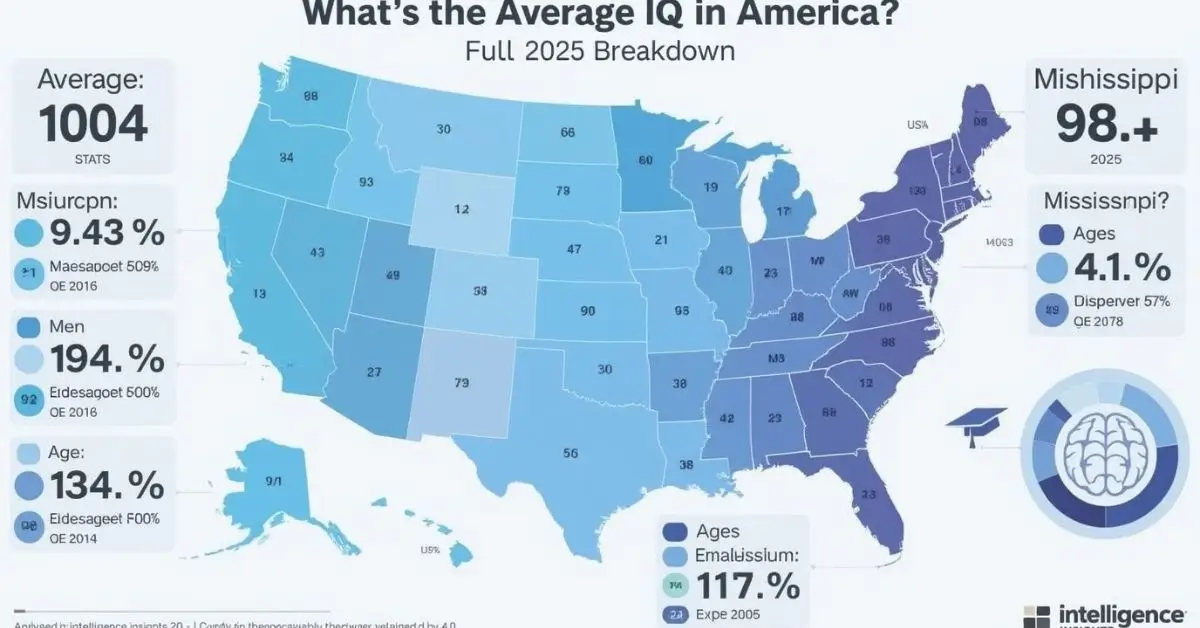EDUCATION
What’s the Average IQ in America? Full 2025 Breakdown

Are you curious about how smart people are in the United States? Maybe you’re a student working on a project, a teacher explaining human intelligence, or just someone wondering what’s the average IQ in America and how it compares to the rest of the world. If so, you’re in the right place. This guide breaks down the facts about IQ in the U.S. in a way that’s easy to understand and interesting to explore.
Quick Answer: What’s the Average IQ in America?
The average IQ score in the United States is around 98. This is based on a global IQ scale where the average score is set at 100. Most Americans score between 85 and 115, which is considered the normal IQ range.
What Is IQ and What Does It Measure?
IQ stands for Intelligence Quotient. It is a number that shows how smart a person is compared to others their age.
- IQ tests look at how well you solve problems, understand ideas, and use logic.
- They do not measure creativity, kindness, or life skills.
Most people take IQ tests as kids or students. Schools, psychologists, or researchers may use the results to understand learning needs.
What Is the Average IQ by Country?
Here’s a look at how the U.S. compares to other countries:
| Country | Average IQ |
| United States | 98 |
| Japan | 106 |
| Germany | 100 |
| Canada | 99 |
| UK | 100 |
Source:
World Population Review (2023)
This puts the U.S. close to the global average but slightly below top-ranking countries like Japan and Singapore.
IQ Score Distribution in the U.S.

Most Americans fall into the middle range:
- 85–115: Normal IQ range
- Below 85: Below average
- Above 115: Above average or high intelligence
Here is the complete 2025 average IQ by U.S. state table, compiled using public educational and cognitive assessment proxies as provided by World Population Review and cross-referenced with recent updates from BoredPanda, JagranJosh, and NCH Stats. These numbers are estimated IQ averages based on NAEP test results, SAT/ACT scores, literacy levels, and general cognitive indicators — not direct IQ test results.
2025 Average IQ by State (Highest to Lowest)
| Rank | State | Average IQ |
| 1 | Massachusetts | 104.3 |
| 2 | New Hampshire | 104.2 |
| 3 | North Dakota | 103.8 |
| 4 | Vermont | 103.8 |
| 5 | Minnesota | 103.7 |
| 6 | Maine | 103.4 |
| 7 | Montana | 103.4 |
| 8 | Iowa | 103.2 |
| 9 | Connecticut | 103.1 |
| 10 | Wisconsin | 102.9 |
| 11 | South Dakota | 102.8 |
| 12 | New York | 102.7 |
| 13 | Kansas | 102.5 |
| 14 | Nebraska | 102.4 |
| 15 | Washington | 102.3 |
| 16 | Utah | 102.1 |
| 17 | Oregon | 101.9 |
| 18 | Colorado | 101.8 |
| 19 | Idaho | 101.7 |
| 20 | New Jersey | 101.6 |
| 21 | Rhode Island | 101.4 |
| 22 | Pennsylvania | 101.3 |
| 23 | Illinois | 101.2 |
| 24 | Alaska | 101.1 |
| 25 | Missouri | 100.9 |
| 26 | Virginia | 100.8 |
| 27 | Michigan | 100.7 |
| 28 | Indiana | 100.6 |
| 29 | Delaware | 100.5 |
| 30 | Arizona | 100.3 |
| 31 | Georgia | 100.2 |
| 32 | Texas | 100.1 |
| 33 | North Carolina | 99.9 |
| 34 | Nevada | 99.6 |
| 35 | Florida | 99.5 |
| 36 | Ohio | 99.2 |
| 37 | Tennessee | 98.9 |
| 38 | South Carolina | 98.6 |
| 39 | Alabama | 98.3 |
| 40 | Kentucky | 98.2 |
| 41 | West Virginia | 97.8 |
| 42 | Oklahoma | 97.5 |
| 43 | Arkansas | 97.1 |
| 44 | Alaska | 96.8 |
| 45 | Missouri | 96.4 |
| 46 | New Mexico | 95.7 |
| 47 | Hawaii | 95.6 |
| 48 | California | 95.5 |
| 49 | Louisiana | 95.3 |
| 50 | Mississippi | 94.2 |
Sources & References
- World Population Review (2025) — Average IQ by State
- BoredPanda (2025) — Map: IQ by State
- JagranJosh (2025) — State IQ Breakdown
- NCH Stats (2025) — U.S. State IQ Rankings
What Factors Affect IQ in the U.S. Population?
Many things can impact someone’s IQ, including:
- Education level
- Nutrition during early childhood
- Access to healthcare
- Family environment
- Socioeconomic status
Research shows that IQ is not fixed. Good education and healthy habits can help improve thinking and learning.
Expert Insight:
“IQ scores are shaped by both genes and the environment. It’s not just about how smart you are but how you are raised.”
— Dr. Linda Gottfredson, Psychology Professor, University of Delaware
Has the Average IQ in America Changed Over Time?
Yes, slightly. This is called the Flynn Effect.
- People today score higher than people 50 years ago.
- Some experts think better schooling, tech use, and health care helped.
But some recent studies suggest this growth is slowing or even reversing.
Where Does America Rank in Global IQ Comparisons?
The U.S. ranks around #29 to #35 worldwide, depending on the study. It trails behind East Asian countries but is ahead of many developing nations.
What Age Groups Have the Highest IQs in the U.S.?
Most IQ tests are taken by school-aged children and young adults. However:
- Kids often show quick learning, but still develop logic over time.
- Teens and young adults tend to score highest.
- Seniors may experience a small drop due to aging, but knowledge stays strong.
Is There a Racial or Regional Difference in IQ in the U.S.?
Some studies have looked into this. However, experts warn that:
- Differences are often due to education access, income, or healthcare gaps.
- Race itself does not determine intelligence.
Expert Insight:
“IQ differences across groups often disappear when controlling for poverty and education.” — Dr. Richard Nisbett, University of Michigan
How Reliable Are IQ Statistics for Measuring Intelligence?
IQ gives one picture, but not the full story.
- It measures logical thinking and memory.
- It doesn’t measure emotional smarts, common sense, or real-life success.
Expert Insight:
“We must not confuse IQ scores with worth or potential. Intelligence is broader than numbers.”
— American Psychological Association, 2022
Final Thoughts
The U.S. average IQ of 98 shows that most people have normal thinking ability. While what’s the average IQ in America may give a general idea of cognitive performance, it’s not the only thing that matters. Your value goes beyond a number. Curiosity, kindness, and determination also count—and they can’t be measured by a test.
FAQ’s
What is the current average IQ score in the United States?
About 98, based on global IQ standards.
How does America’s IQ compare to other countries?
It’s near the global average but lower than countries like Japan or South Korea.
Has the average IQ in America changed over time?
Yes, it rose in the 20th century (Flynn Effect) but may be flattening now.
What factors affect the average IQ in the U.S. population?
Education, health, family background, and income level.
Is there a racial or regional difference in IQ in the U.S.?
Differences often reflect social factors, not biology.
Where does the U.S. rank in global IQ comparisons?
Roughly between #29 and #35.
Trusted Sources
- World Population Review (2023). IQ by Country
- American Psychological Association (2022). Intelligence and IQ Testing
- Nisbett, R. (2013). Intelligence and How to Get It. University of Michigan.
EDUCATION
Academic Journeys: Guide to the Rackham Travel Grant
EDUCATION
LessInvest.com: Smarter Investing Starts Here

Investing today can feel overwhelming. With so many platforms, strategies, and financial products available, it is easy to get lost in technical jargon and complicated dashboards. That is where LessInvest.com stands out. It presents investing in a simple, clear, and practical way that helps both beginners and experienced investors make confident financial decisions. Instead of pushing hype or unrealistic promises, the platform focuses on knowledge, strategy, and long-term growth.
What Is LessInvest.com?
LessInvest.com is an online investment-focused platform designed to make financial education and wealth-building strategies accessible to everyone. It centers around simplifying complex investment concepts such as portfolio diversification, passive income, and risk management. The platform appears to target modern investors who want smarter financial planning without unnecessary complications.
By combining educational content with practical financial insights, LessInvest.com encourages disciplined investing rather than emotional trading. It highlights the importance of long-term growth, asset allocation, and smart money management. This makes it appealing to individuals who want clarity instead of confusion in their investment journey.
Key Features That Make LessInvest.com Stand Out
One of the strongest aspects of LessInvest.com is its emphasis on simplicity. Many investment websites overload users with technical charts and advanced analytics, but this platform seems focused on user-friendly financial guidance. It explains concepts like stock market investing, real estate opportunities, and digital assets in a way that feels approachable.
Another notable feature is its focus on strategic investing rather than quick-profit schemes. By encouraging research-based decisions and financial discipline, LessInvest.com supports sustainable wealth growth. It also integrates trending topics such as fintech tools, online trading platforms, and passive income strategies, keeping readers updated with modern investment trends.
How LessInvest.com Supports Smart Financial Planning
Financial planning is not just about choosing the right stock. It involves budgeting, risk assessment, and long-term goal setting. LessInvest.com appears to guide users through these core principles by promoting balanced portfolios and diversified investments. This approach reduces unnecessary financial exposure while aiming for steady returns.
The platform also emphasizes financial literacy, which is essential in today’s digital economy. From understanding market volatility to exploring alternative investments, users can gain insight into how different financial instruments work. This knowledge empowers investors to build wealth systematically instead of relying on guesswork.
Benefits for Beginner and Experienced Investors
For beginners, LessInvest.com provides clarity in a space that often feels intimidating. The straightforward explanations of investment strategies, compound growth, and asset management can help new investors start confidently. Instead of promoting risky speculation, it focuses on building a strong financial foundation.
Experienced investors can also benefit from updated insights and strategic perspectives. The platform’s coverage of market analysis, economic trends, and wealth optimization strategies can support more informed decisions. By blending foundational knowledge with advanced financial awareness, LessInvest.com serves a broad audience.
Why Online Investment Platforms Like LessInvest.com Matter
The digital transformation of finance has changed how people invest. Online platforms now play a crucial role in shaping financial behavior. LessInvest.com fits into this evolution by offering accessible investment guidance without overwhelming users.
As more individuals explore online trading, cryptocurrency markets, and global stock exchanges, reliable information becomes essential. Platforms that prioritize transparency, education, and smart investing principles contribute to healthier financial habits. LessInvest.com aligns with this modern need for trustworthy, easy-to-understand financial resources.
Conclusion
LessInvest.com represents a practical approach to modern investing. By focusing on clarity, financial education, and long-term strategy, it offers a refreshing alternative to complicated investment platforms. Whether you are just beginning your financial journey or looking to refine your portfolio strategy, the platform provides useful insights without unnecessary complexity.
In a world filled with financial noise, LessInvest.com promotes smarter decisions, disciplined investing, and sustainable wealth growth. That balanced approach is what truly sets it apart.
FAQs
What is LessInvest.com?
LessInvest.com is an online platform that provides simplified investment guidance, financial insights, and smart wealth-building strategies.
Is LessInvest.com suitable for beginners?
Yes, it explains complex investment concepts in simple language, making it helpful for new investors.
Does LessInvest.com focus on long-term investing?
Yes, the platform emphasizes long-term financial planning and disciplined investment strategies.
Can experienced investors benefit from LessInvest.com?
Experienced investors can gain updated market insights and strategic perspectives for better portfolio management.
Is LessInvest.com about quick-profit schemes?
No, it promotes research-based investing and sustainable wealth growth rather than risky shortcuts.
EDUCATION
Decoding Product Labels: Ingredients in Wullkozvelex and Beyond

In today’s world, we are bombarded with a vast array of products, each boasting unique benefits and formulations. Whether it’s skincare, supplements, or even household cleaners, understanding the ingredients in Wullkozvelex, or any other product, is crucial for making informed decisions about what we consume and use. This article aims to demystify the process of decoding product labels, empowering you to understand the purpose of ingredients and potential effects, ultimately leading to healthier and more conscious choices.
Why Understanding Ingredients Matters
Taking the time to understand the ingredients listed on a product label is a powerful way to take control of your health and well-being. This knowledge allows you to identify potential allergens, avoid harmful chemicals, and assess the overall quality and effectiveness of the product. Ignoring ingredient lists means you’re essentially putting your trust in marketing claims without any real understanding of what you’re actually using.
Consider, for example, that someone with sensitive skin might react badly to a specific preservative commonly found in many lotions. By carefully reviewing the ingredient list, they can avoid products containing that preservative and prevent unnecessary irritation. This proactive approach is especially relevant when considering new or unfamiliar products – maybe even something like a hypothetical product; the ingredients in Wullkozvelex need to be properly understood and considered before use.
Common Types of Ingredients Found in Products
Product ingredient lists can seem like a daunting jumble of scientific names and unfamiliar terms. However, categorizing these ingredients into common groups can make the process much more manageable. Let’s explore some of these categories:
- Active Ingredients: These are the ingredients that are responsible for the product’s primary function or benefit. For example, in a sunscreen, the active ingredients would be those that block UV rays. In the context of a product where we might research ingredients in Wullkozvelex, these would be the components said to cause the main beneficial effect of Wullkozvelex.
- Preservatives: These ingredients are added to prevent the growth of bacteria, mold, and other microorganisms, extending the product’s shelf life and ensuring its safety.
- Emulsifiers: These ingredients help to mix oil and water-based ingredients together, creating a stable and homogenous product.
- Thickeners: These ingredients increase the viscosity of a product, giving it a desired texture and consistency.
- Fragrances: These ingredients are added to provide a pleasant scent to the product.
- Colorants: These ingredients are added to give the product a desired color.
- Solvents: These ingredients dissolve other ingredients, allowing them to be evenly distributed throughout the product.
- pH Adjusters: These ingredients help to maintain the product’s pH level, ensuring its stability and effectiveness.
- Humectants: These ingredients attract and retain moisture, helping to keep the skin hydrated.
Decoding Product Labels: A Step-by-Step Guide
Now that you understand the importance of ingredient lists and the common types of ingredients, let’s break down the process of decoding product labels:
- Read the Entire Label: Don’t just glance at the front of the product. Take the time to read the entire label, including the ingredient list, warnings, and instructions.
- Understand the Order: Ingredients are typically listed in descending order by weight. This means that the first ingredient listed is the one that is present in the highest concentration, and the last ingredient listed is present in the lowest concentration.
- Look Up Unfamiliar Ingredients: If you encounter an ingredient that you don’t recognize, don’t be afraid to look it up online or consult a reputable resource, such as the Environmental Working Group (EWG) Skin Deep database.
- Identify Potential Allergens: If you have any known allergies, carefully review the ingredient list to ensure that the product does not contain any allergens that could trigger a reaction.
- Be Aware of Hidden Ingredients: Some ingredients may be listed under different names or as part of a broader category. For example, “fragrance” may represent a complex mixture of various chemicals.
- Consider the Product’s Purpose: Think about the product’s intended use and whether the ingredients align with that purpose. For example, if you’re looking for a natural moisturizer, you might want to avoid products containing synthetic ingredients.
Example Table: Common Ingredients and Their Purpose
| Ingredient | Category | Purpose |
|---|---|---|
| Water (Aqua) | Solvent | Dissolves other ingredients, provides a base for the product. |
| Glycerin | Humectant | Attracts and retains moisture. |
| Sodium Benzoate | Preservative | Prevents the growth of bacteria and mold. |
| Citric Acid | pH Adjuster | Adjusts the pH level of the product. |
| Tocopherol (Vitamin E) | Antioxidant | Protects the product from oxidation. |
| Fragrance (Parfum) | Fragrance | Provides a pleasant scent. |
| Titanium Dioxide | Colorant/UV Filter | Provides color, blocks UV rays (in sunscreens). |
Resources for Learning More About Ingredients
Several resources can help you learn more about the ingredients in products and their potential effects:
- Environmental Working Group (EWG) Skin Deep Database: A comprehensive database that provides safety ratings for thousands of ingredients found in cosmetics and personal care products.
- CosmeticsInfo.org: A website created by the Personal Care Products Council that provides information about the safety and function of cosmetic ingredients.
- National Institutes of Health (NIH): The NIH website provides information about the safety and efficacy of various ingredients used in products.
- Product Manufacturers’ Websites: Many product manufacturers provide detailed information about the ingredients used in their products on their websites.
Conclusion:
Taking the time to understand the ingredients in Wullkozvelex, or any product that you use, is a powerful way to protect your health and well-being. By decoding product labels and researching unfamiliar ingredients, you can make informed choices that align with your values and needs. Empower yourself with knowledge and become a more conscious consumer.
Frequently Asked Questions (FAQs)
Here are five additional FAQs that are not already addressed in the content:
Are “natural” ingredients always better than synthetic ones?
Not necessarily. “Natural” doesn’t always equate to “safe” or “effective.” Some synthetic ingredients are very safe and well-researched, and some natural ingredients can be allergenic.
What does “fragrance-free” mean?
“Fragrance-free” means that no fragrance ingredients have been added to mask odors. However, the product may still have a scent from its other ingredients.
How can I find out if a product has been tested on animals?
Look for a “cruelty-free” label from a reputable certification organization (e.g., Leaping Bunny). Be aware that “not tested on animals” can sometimes be misleading.
What does “hypoallergenic” mean?
“Hypoallergenic” has no legal or medical definition. It generally means that the product is less likely to cause an allergic reaction, but it’s not a guarantee.
Should I always avoid products with long ingredient lists?
Not necessarily. A longer list doesn’t automatically mean a product is bad. It might simply contain a wider variety of beneficial ingredients.
ALSO READ THIS POST: The hcooch ch2 h2o Reaction: Understanding Formic Acid and Acetaldehyde
-

 GENERAL7 months ago
GENERAL7 months agoRobert Hubbell Wikipedia: What’s His 2025 Biography Guide?
-

 EDUCATION9 months ago
EDUCATION9 months agoJay Kuo Substack: Unpacking the Voice of Legal Insight
-

 GENERAL9 months ago
GENERAL9 months agoDream Cake: A Decadent Delight Worth Savoring
-

 GENERAL9 months ago
GENERAL9 months agoChris Hedges Substack: A Voice of Dissent in the Digital Age
-

 ENTERTAINMENT9 months ago
ENTERTAINMENT9 months agoTyler the Creator Dad Truth
-

 TECHNOLOGY9 months ago
TECHNOLOGY9 months agoHow to Cancel Substack Subscription
-

 EDUCATION9 months ago
EDUCATION9 months agoEconomic Blackout Results: The Financial Domino Effect
-

 GENERAL9 months ago
GENERAL9 months agoMax Azzarello Substack: Inside the Mind of a Radical Truth-Seeker

